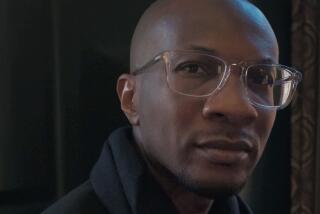Doing Business : The Steel Plant and the Witch Doctor: A Case Study for Harvard ? : An American in Togo has some novel solutions for the Third World’s thorny business predicaments.
- Share via
LOME, Togo — Here’s a case study that won’t make the curriculum at Harvard Business School:
A novice executive at a foreign-owned factory here arrived to find his 200 workers lined up outside the gates, refusing to go in. It seems a witch doctor had cast a spell on the grounds by cutting off a chicken head and spraying its blood around the entrance.
The executive put through a panicky call to John Moore, an American who had been running a neighboring steel fabricating plant for six years.
“Well, I didn’t have much practical experience, but I told him he had to get another witch doctor to cast a stronger spell,” Moore recalls. “Luckily, one of my drivers had a relative who was one, and that’s what we did.”
Not all the advice Moore offers expatriate businessmen coming to Africa is quite so outre. But being a Westerner in the virtually unique position of owning and managing an entirely local enterprise--rather than an African subsidiary of a large multinational--gives the 51-year-old Moore an unrivaled feel for how to function in what must be one of the most difficult and unusual business climates in the world.
It’s not only the vast, often hostile, bureaucracies and almost complete absence of modern infrastructure in sub-Saharan Africa that make business tough. Labor is cheap, but energy is expensive. The currencies are either close to worthless or, like the French-subsidized CFA franc that is legal tender in Togo and 12 other African countries, so overvalued that you cannot hold too much cash, lest you lose a bundle if and when it is officially devalued.
The market is minuscule; a World Bank estimate last year found that the gross national products of all 42 countries of sub-Saharan Africa, taken together, were roughly equal to that of Belgium. That makes much of the strain of establishing business in Africa seem less than worthwhile.
Africa’s reputation as a continent of war, disaster and corruption is a great obstacle to attracting new business.
With the 1980s considered a lost decade in terms of the continent’s economic development, and with the example of Eastern Europe before it, many governments here are starting to open their doors to the kind of private foreign investors they spent the last 30 years cursing as greedy exploiters.
They should not be surprised if there is no flood of interested parties, despite the proliferation of Western-style investment codes guaranteeing protection from nationalization and the right to send 100% of their local profits back home.
Many Western businessmen consider Africa politically hostile, and with good reason. Even countries with a professed goal of attracting new investors still pay lip service to the old political credos. Just last April, for instance, President Jerry J. Rawlings of Ghana--a country that has been held up by the World Bank as a “model” of progressive economic policy--stunned a meeting of potential foreign investors by launching an attack on capitalist exploitation.
For all that, Moore argues that much of Africa’s sour image is unearned. Take corruption: “I tell people that Africa didn’t invent it. The rest of the world, in my opinion, is just as corrupt.” Here, at least, it’s understandable. “In Benin, the civil service hasn’t been paid in four or five months. Of course they’re going to ask you for a little ‘contribution.’ ”
Moore moved to Togo in 1983 to lease a steel mill the government was trying to divest. Since then he has expanded by picking up steel fabricating plants in nearby Ivory Coast and Benin. He is among the first applicants for space in Togo’s latest economic initiative, a free-trade zone where he hopes to assemble steel pylons and manufacture wire, all for export duty free. Last year the three-country group made sales of about $15 million, and Moore is hoping to raise that to $20 million this year and to $35 million in 1991.
Meanwhile he spends a lot of time helping the Togolese promote their country as the best place in West Africa for foreigners to do business--its military government notwithstanding. The government is committed to moving into a free-market economy, he says, and both the bureaucracy and the military keep a low profile.
“The Togolese are lucky to have him here,” remarked one Western diplomat. “He’s sharp and well-financed, and he’s an experienced businessman.”
Moore’s experience makes him think the free-trade zone idea has been oversold as an economic panacea. Some Togolese officials are predicting it will bring in 15,000 new jobs, a wildly optimistic figure given the fact, among others, that Togo’s zone is one of four being proposed for the West African coast alone.
“T hese sorts of initiatives become the flavor of the month,” Moore says. And he does not see a lot of eager investors slavering to enter the African market. “I doubt many others will come along after me.”
Why not? The risks of doing business, including political instability, economic calamity and distance from decent markets, mean that an investor requires as much as a 25% return on invested capital. That’s a level that not even Moore has reached. His firm, STS (for Societe Togolaise de Siderurgie), makes about 14%, he says, although he takes a lot more out in management fees.
Another problem is staff. Start with the African work force. “The African worker, if properly motivated, is very good,” he says. The tremendous underemployment in most African countries, coupled with the size of the extended families each employed person must support, means that workers will respond eagerly to incentives. Sometimes too eagerly: To meet production targets they also tend to take unnecessary risks, Moore says. At his Lome rolling mill he has installed a production incentive, but the rule is that any accident on the line will wipe out the entire bonus for that shift.
Expatriate help is hard to recruit. “I’m constantly looking for new people,” he says. “The best and the brightest don’t want to move to Africa. So you get retreads just short of retirement or green kids.”
Those who do come over tend to burn out from the isolation. “It’s difficult if you’re single, because there are no white women around. We send them home for R & R every six months.”
Like so many expatriates one meets in remote corners of Africa, Moore’s resume is what one might charitably call picaresque. He was born in India to American parents and educated in Britain and at the University of Virginia. There was a stint in the army before he took a job with a Swiss banking group and resigned to start a company to build hospitals in the Middle East.
After that he did some publishing in South America, running a magazine that was later partially sold to the French publishers Hachette. In the late 1970s his father, in the steel business, got him involved in a steel plant in Panama; when Gen. Manuel A. Noriega began his rise there, Moore left. He says his Britain-based investment firm still owns 10% of the Panama venture.
Along the way Moore spent some time in New York selling Russian art, until a deal with the Soviet government to market reproductions of paintings from the Tretyakov Gallery fell through.
One advantage of all of this travel, Moore maintains, is a good feel for what goes on in places outside the mainstream of Western business.
“I haven’t seen too much here that I hadn’t seen already in South America and the Mideast,” he says. “There are no new moves.”
Most of the old moves he views with nonchalance. “We don’t have a week that goes by here in which a minister doesn’t call up and say he has a grandson, or a cousin, who needs a job. We interview him, and if there’s an opening we give it to him. If not, the minister gets a form letter. You’ve got to give him that much. You have to give the minister the courtesy of interviewing his candidate.”
Then there’s bribery. As much as Moore contends it’s a world-wide problem, he does take steps to deflect it.
“The minute you start paying (bribes) you’re a marked man,” he says. His alternative: “We build up I.O.U.s,” he says. “If an official’s got a sick kid and he needs to fly him out of the country, I might come up with an air ticket. If he happens to be head of customs, that’s good luck for me. But I never do it as a tie-in for something I want. I’d rather give it to him ahead of time.”
Doing business in Africa has given Moore a window on the place that few other travelers see. One time he was invited to meet the chief economics adviser to Liberian President Samuel K. Doe. “I don’t know why you won’t invest in this country,” the man said, adding in all seriousness: “The Liberian dollar trades at two-to-one to the American dollar. But the Japanese yen is only 140 to one. We’re obviously much stronger.”
At another point he found himself on an endless train ride into the interior of the Congo bush in search of a $12-million steel plant the government had put up for sale. The plant turned out to be 30 kilometers from the railhead, which itself could only be used eight months of the year. At the site itself, Moore discovered the plant equipment still disassembled in the original shipping crates. The government nevertheless wanted the full $12 million for it.
“I said, ‘You’ve got the world’s largest collection of mushrooms out there.’ I offered to take the embarrassment off their hands for $500,000.”
The ministers were appalled. “They said, ‘But this belongs to the people. We can’t sell it at that price. The people would rebel.’ ”
Naturally enough, Moore has his critics in Togo. These include the French, who are irked that American economic proposals, like the free-trade zone, are being accepted so readily in France’s old colonial back yard. French diplomats here whisper dark suggestions about Moore’s business dealings in Latin America, but they have never produced any hard evidence against him to the Togolese.
More important are the complaints of the World Bank, always a potent economic force in a country as poor as Togo. Although Moore says he got a letter from the World Bank accepting the deal in principle before buying the plant, the institution has since criticized the high tariffs Togo levies on imported steel products to keep Moore’s product saleable.
The World Bank says it is not opposed to all high tariffs in developing countries--only to those protecting industries that don’t do much. “We’re looking at excessive protection where the value-added is small,” says Jacques Daniel, the World Bank’s resident representative in Lome.
Since Moore buys his raw steel from abroad, the only gain for Togo from his operation is a small amount of tax on those imports and from salaries paid to 345 workers. That’s not enough to justify a 43% tariff on imported steel products, Daniel suggests.
But Moore contends that with Africa looking increasingly marginal in the world economy, even greater incentives are needed to attract capital. Competition is too great today elsewhere. “If I were looking for a place to invest right now, would I be here?” he asks. “I’d be in Eastern Europe.”
More to Read
Inside the business of entertainment
The Wide Shot brings you news, analysis and insights on everything from streaming wars to production — and what it all means for the future.
You may occasionally receive promotional content from the Los Angeles Times.










